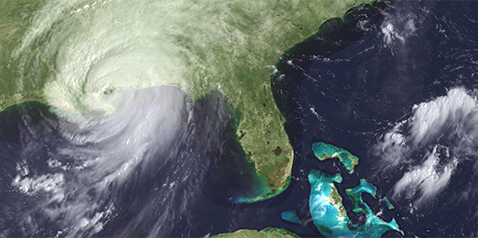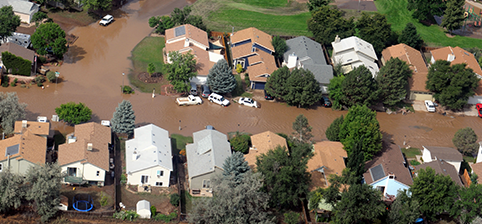Advocacy
Reinsurance is critical to risk management in the property and casualty insurance industry. To provide consumers and businesses with more insurance at lower prices, ABIR advocates for a robust insurance market open to as many competitors as possible.
Property/Catastrophe

Global reinsurers are financially strong and have substantial capacity to support insurance companies in the wake of disaster. The ability to pool US hurricane and earthquake risks with the risks for typhoons in Japan or earthquakes in Latin America means coverage costs less than it would without reinsurance.
For example, ABIR members and other Bermuda (re)insurers provided nearly 25% of reinsurance to the Texas Windstorm Pool, have paid USD $9.2 billion for the 2017-2019 California Wildfires, and were estimated to pay 30% of 2017 Hurricanes Harvey, Irma and Maria losses. Even with record-setting losses, reinsurance is available because the market is so resilient and because the business model calls for global pooling of losses to achieve diversification. In fact, the market generally attracts more capital which generates more capacity in spite of the losses.
US Regulatory Issues (Local & National)
Insurance works best in providing value to consumers when markets are competitive. Sometimes poorly designed regulation impedes market competition. Regulatory barriers can discourage cross-border trade. Furthermore, government run insurance programs can lead to subsidized insurance prices which freeze out insurers. When prices are subsidized consumers miss price signals about hazards in construction, location or peril.
Regulatory barriers to private sector risk bearing can be removed, be they poor residual market design, mandated cross subsidies or barriers to entry. Reinsurance regulation in the US is now evolving to recognize expert regulation enforced by non-US regulators; the new measures also call for an independent assessment of the financial strength of non-US reinsurers. These changes including the removal of reinsurance collateral requirements are expected to help identify financially strong reinsurers, create incentives for reinsurance buyers to conduct additional due diligence on selection of counter parties and move the US insurance regulatory system closer to international norms in open markets and supervisory risk assessment. Regulatory modernization is being led by the National Association of Insurance Commissioners (NAIC) and is being analyzed by the US Treasury’s Federal Insurance Office.
International Regulatory Issues
The Global Recession of 2008 has led G-20 policymakers to redesign regulation of banks, securities and insurers. International standard setters are focused on a common regulatory framework and a broader set of guidelines and standards that would be applied to insurers. Risk management, corporate governance, capital requirements, financial reporting, use of debt, use of reinsurance and other elements of risk management and operational structure will be subject to new advisory regulatory standards which will be recommended to jurisdictions for adoption. The end result is intended to be a harmonized level of regulation applied to global insurance and reinsurance firms.
Climate Change

For decades, Bermuda's unique re/insurance market has played a lead role in protecting the world against the devastating impact of catastrophic events. Time and again, the market has delivered to consumers whose lives have been upended. Bermuda re/insurers have paid out more than quarter of a trillion dollars over the past 20 years in claims arising from disasters both natural and man-made - and that's in the United States and European Union alone.
With the effects of climate change creating the potential for unprecedented catastrophe losses in the coming years, Bermuda's role has never been more globally relevant. The island's rich pedigree in natural catastrophe re/insurance and deep expertise in the science of catastrophe risk management makes it an ideal champion in the efforts to increase insurance coverage in disaster-prone developing countries that often lack it.
Bermuda's re/insurance market is heavily involved in the public-private sector collaboration to close the "protection gap", in finding ways to optimise and extend the use of insurance and risk management capabilities to build greater resilience and protection for people, communities, businesses, and public institutions.
Follow how Bermuda is becoming the World's Climate Risk Capital:
- ABIR's #ClimateChange Webinar
- Bermuda's role in closing the protection gap
- World's climate risk capital a natural progression for Bermuda
- BIOS: World leader in ocean science
ABIR members support climate science research through their contributions to the Bermuda Institute for Ocean Sciences (BIOS) – a leading Bermuda-based climate science research facility – Risk Prediction Initiative, through their work with the Geneva Association, the Insurance Development Forum and through individual climate research projects – some public and some proprietary – that enhance business and public policy knowledge.
Our ability to better understand climate change risks will help to promote better public policy decisions that will encourage the insurability of homes and businesses. Heightened focus on hazard mitigation, building resilience, land use planning and safer, stronger communities enhances the opportunity for private capital to insure and reinsure catastrophe exposed risk, thus reducing further exposure to taxpayers in subsidizing those insurance claims. Importantly, it protects people and property from damage and injury with stronger and safer communities.
Hazard Mitigation
ABIR members are experts in insuring against catastrophe losses. What they also know is that the best way to protect people and property is to invest in hazard mitigation. Land use planning, elevation, building code disaster resistant design and enforcement, and emergency response education are all central to protecting people and property from the risks created by earthquakes, hurricanes, tornados, flooding, hail and wind. The US industry’s foundation work in protecting against electrical hazards (Underwriters Laboratories), theft and fraud (National Insurance Crime Bureau) and highway safety research (Insurance Institute for Highway Safety) is matched with the property insurance focused work of the Insurance Institute for Business and Home Safety (IIBHS). ABIR members participate in many of these research organizations. The IIBHS conducts groundbreaking research on construction and materials design focused on making structures more resilient to damage from fire, earthquake, wind, water and hail. The research has resulted in the fortified homes project, building code modernization and spillover benefits in energy conservation and sustainable building practices. Bermuda’s own experience in the middle of the Atlantic Ocean’s hurricane belt has contributed to common sense construction techniques that store rainwater, build with strong stone walls, design with limited window openings and roof structures engineered to increase wind resistance and reduce uplift.
